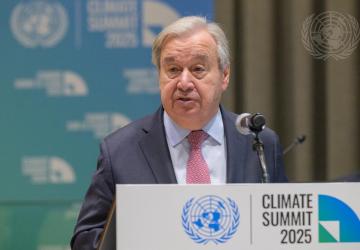UN Secretary-General's remarks to the Opening of the High-level Special Event on Climate Action

Excellencies, dear friends,
As we have just heard, it is still possible to limit global temperature rise to 1.5 degrees by century’s end.
We know what permanently breaching that limit would mean for people and planet.
The science compels climate action.
So does the economics.
Clean energy is powering jobs, growth and sustainable development…
Generating the fastest and cheapest electricity…
Insulating economies from volatile fossil fuel markets…
Providing energy security and sovereignty…
And helping to deliver clean and affordable energy for all.
Despite vast fossil fuel subsidies distorting markets, clean energy received double the investment of fossil fuels last year.
The bottom-line: clean is competitive, and climate action is imperative.
Excellencies,
The Paris Agreement has made a difference.
In the last ten years, projected global temperature rise has dropped from four degrees Celsius to less than three - if current NDCs are fully implemented.
Now, we need new plans for 2035 that go much further, and much faster:
Delivering dramatic emissions cuts aligned with 1.5 degrees; covering all emissions and sectors; and accelerating a just energy transition globally.
Your new plans can take us a significant step forward.
A UN report will calculate their impact for global emissions.
If they fall short, we must create the conditions for a decade of Acceleration.
We know it can be done.
China met its 2030 wind and solar target six years ahead of schedule.
India reached 50% electricity capacity from non-fossil fuels five years early.
We are in the dawn of a new energy era.
We must seize this moment of opportunity.
COP30 in Brazil must conclude with a credible global response plan to get us on track.
Five areas are crucial:
First, energy.
Fossil fuels still dominate.
We must supercharge the clean energy transition.
Investing in grids and storage to unlock the full potential of renewables.
Lowering capital costs for developing countries.
And redirecting fossil fuel subsidies to a just transition.
Second, methane – a potent global heating gas.
Drastic cuts this decade are essential – and most can be achieved quickly and cheaply.
The International Energy Agency estimates fossil fuel operations could cut 40% of methane emissions today with no net cost.
Third, forests.
We must end the destruction of nature’s greatest carbon sinks.
This could deliver a fifth of needed emissions reductions by 2030.
Fourth, heavy industry.
We have seen important advances in technologies to cut emissions from steel and cement, and heavy transport.
They must be deployed – urgently.
Fifth, climate justice.
Developing countries that did least to cause the crisis are suffering the most.
Climate disasters are inflicting damages that exceed the GDP of some small islands.
Droughts and floods are taking lives, fuelling hunger, and inflaming conflict.
All while finance gaps prevent investments in adaptation and resilience.
We need urgent action:
To unlock funds for developing countries - to seize clean energy benefits and protect lives and economies.
That requires reforming the international financial architecture to strengthen developing country participation.
We need effective debt relief, and scaled-up solutions like debt swaps and disaster pause clauses.
We need a major increase in the lending capacity of multilateral development banks;
Significant contributions to the Loss and Damage Fund – including from innovative sources;
And a major boost in adaptation finance – with developed countries meeting their pledge to double funding this year.
COP 30 must show a credible path to mobilizing the $1.3 trillion annually in climate finance by 2035, as agreed at COP 29 in Baku:
Identifying sources – existing and new;
Outlining policies, instruments and actions to make finance accessible, affordable, and at scale;
And establishing credible accountability measures to verify progress.
Excellencies,
The science demands action.
The law commands it.
The economics compel it.
And people are calling for it.
I look forward to hearing how you will respond – and the UN stands ready to help you to deliver.
Thank you very much.

